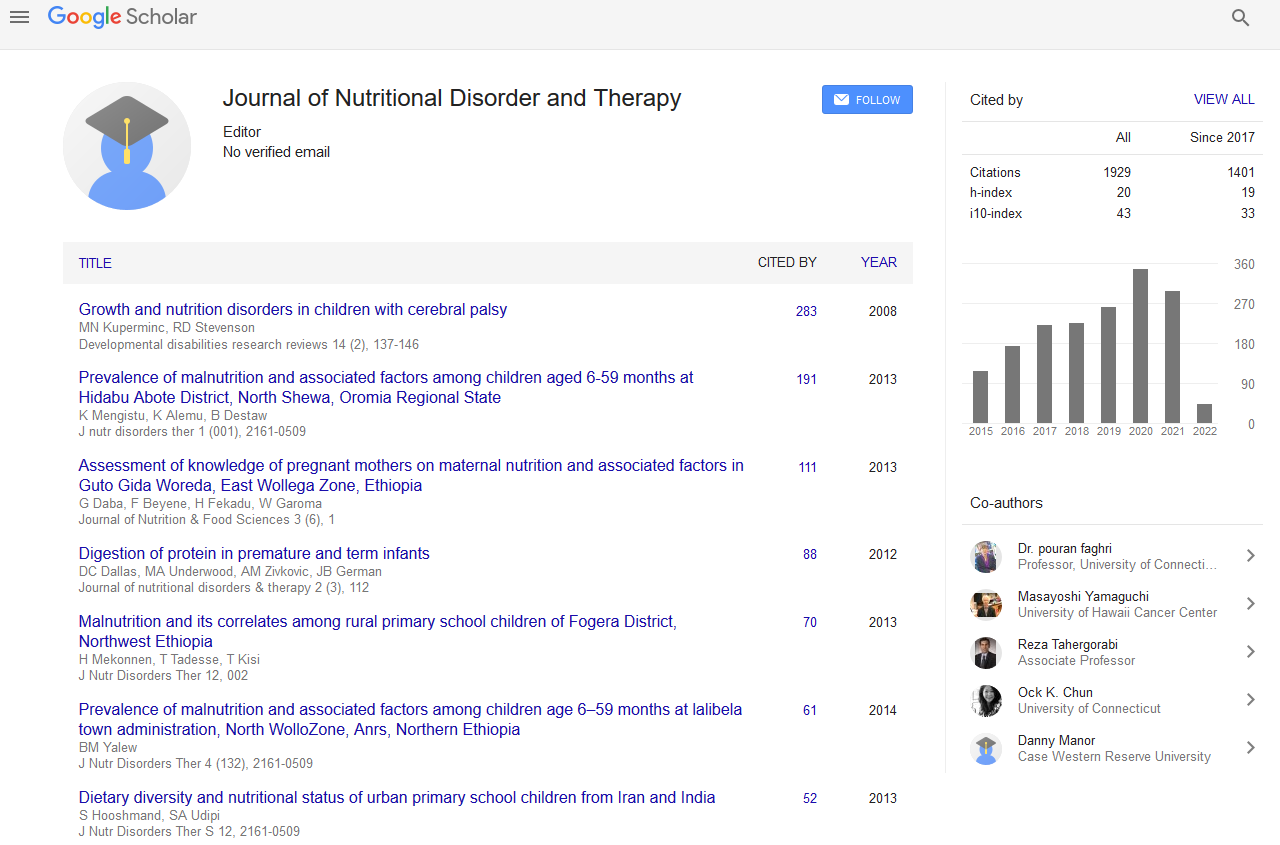Indexed In
- Open J Gate
- Genamics JournalSeek
- Academic Keys
- JournalTOCs
- Ulrich's Periodicals Directory
- RefSeek
- Hamdard University
- EBSCO A-Z
- OCLC- WorldCat
- Publons
- Geneva Foundation for Medical Education and Research
- Euro Pub
Useful Links
Share This Page
Journal Flyer

Open Access Journals
- Agri and Aquaculture
- Biochemistry
- Bioinformatics & Systems Biology
- Business & Management
- Chemistry
- Clinical Sciences
- Engineering
- Food & Nutrition
- General Science
- Genetics & Molecular Biology
- Immunology & Microbiology
- Medical Sciences
- Neuroscience & Psychology
- Nursing & Health Care
- Pharmaceutical Sciences
Does type of infant feeding affect phototherapy for neonatal hyperbilirubinemia?
International Conference on Pediatric Nutrition
August 01-02, 2016 New Orleans, USA
Abeer El Sakka, Safaa S.Imam, Mohamed El Barbary and Wafaa Ibrahium
Ain Shams University, Egypt
Posters & Accepted Abstracts: J Nutr Disorders Ther
Abstract:
Phototherapy is the most common method used to treat and prevent neonatal hyperbilirubinemia. Breastfeeding compared with formula feeding is associated with an increased risk of jaundice and kernicterus. The main mechanism is failure of successful initiation of breastfeeding. Breast failure jaundice usually leads to significant weight loss resulting in hyperbilirubinemia. The aim was to determine the relation between type of infant feeding and the efficacy of phototherapy for treatment of hyperbilirubinemia in term newborns. The authors included 90 full-term neonates diagnosed with nonhemolytic, unconjugated hyperbilirubinemia. According to their total bilirubin level, they received conventional phototherapy for treatment. They were divided into 3 groups according to type of feeding: group 1, mixed feeding (MF; breast and formula); group 2, formula feeding (FF; formula); and group 3, breastfeeding (BF). Rebound bilirubin was checked 24 hours after stopping phototherapy. The mean duration of phototherapy was more in the BF group, followed by the MF and FF groups (P<0.01). There was a significant positive correlation between bilirubin level and weight loss at the start of phototherapy in the groups studied (r = 0.635; P<0.001). Rebound bilirubin level was higher in BF followed by FF and MF newborns, with significant differences (P=0.005). These results indicate that phototherapy effectively reduces bilirubin levels in BF newborns with hyperbilirubinemia. These infants show a significantly slower response to this treatment than FF or MF newborns. Prevention of breast milk failure would decrease weight loss, which is associated with high bilirubin at the start of phototherapy.
Biography :
Abeer El Sakka is an Assistant Professor of Pediatrics, Ain Shams University, Cairo, Egypt. She completed her Medical school at Ain Shams University, Faculty of Medicine, Cairo Egypt in 1988. She completed her Medical training as a Pediatric resident at Ain Shams University Pediatric Department from 1989-1993. She completed research in the past two years at University of Texas Health Science Center, San Antoni, TX. She is an instructor of NRP, STABLE program, PALS and APLS. She has published many articles in Nutrition and Pediatrics. She is a reviewer at some prestigious journals.
Email: drasakka@gmail.com


